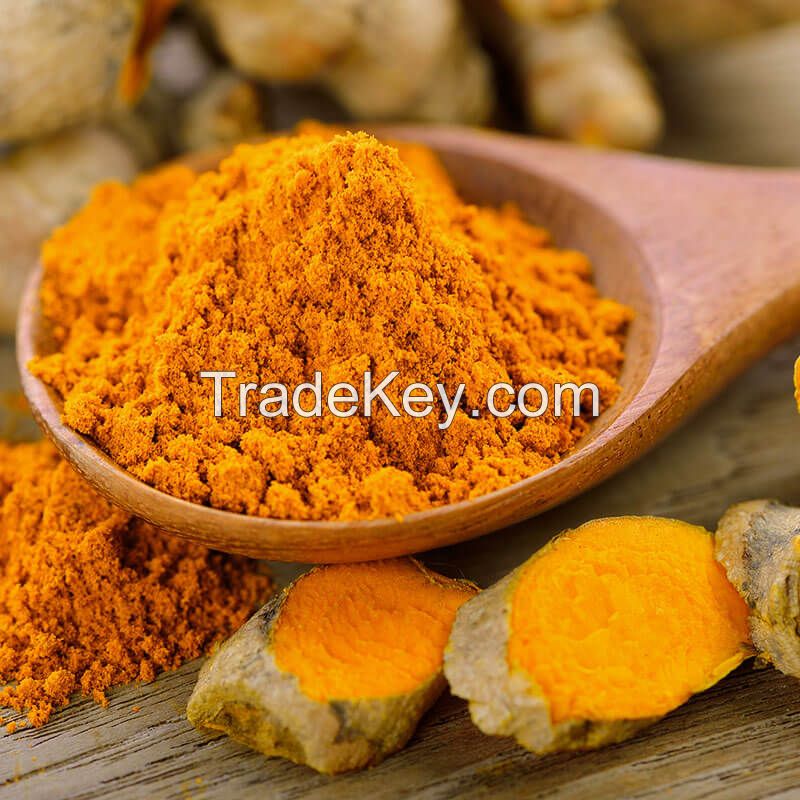La description
Turmeric
Turmeric is a bright yellow-orange spice commonly used in curries
and sauces.
Eases arthritis symptoms.
Helps prevent Alzheimer's disease.
Helps prevent cancer.
Maintains ulcerative colitis remission.
Boosts the immune system.
Lowers cholesterol.
Can help treat uveitis.
1. Turmeric Contains Bioactive Compounds With Powerful
Medicinal Properties
Turmeric is the spice that gives curry its yellow color.
It has been used for thousands of years as a spice and medicinal
herb.
Recently, science has started to back up what Indians have known
for a long time it really does contain compounds with
medicinal properties
These compounds are called curcuminoids, the most important of
which is curcumin.
Curcumin is the main active ingredient in turmeric. It has
powerful anti-inflammatory effects and is a very strong
antioxidant.
However, the curcumin content of turmeric is not that high. Its
around 3%, by weight.
Most of the studies on this herb are using turmeric extracts that
contain mostly curcumin itself, with dosages usually exceeding 1
gram per day.
It would be very difficult to reach these levels just using the
turmeric spice in your foods.
Therefore, if you want to experience the full effects, you need
to take a supplement that contains significant amounts of
curcumin.
The best curcumin supplements contain piperine, substantially
increasing their effectiveness.
Curcumin is also fat soluble, so it may be a good idea to take it
with a fatty meal.
2. Curcumin Is a Natural Anti-Inflammatory
Compound
Inflammation is incredibly important.
It helps your body fight foreign invaders and also has a role in
repairing damage.
Without inflammation, pathogens like bacteria could easily take
over your body and kill you.
Although acute, short-term inflammation is beneficial, it can
become a major problem when it becomes chronic and
inappropriately attacks your body's own tissues.
Chronic, low-level inflammation plays a major role in almost
every chronic, Western disease. This includes heart disease,
cancer, metabolic syndrome, Alzheimer's and various degenerative
conditions
Therefore, anything that can help fight chronic inflammation is
of potential importance in preventing and even treating these
diseases.
Curcumin is strongly anti-inflammatory. In fact, its so powerful
that it matches the effectiveness of some anti-inflammatory
drugs, without the side effects.
It blocks NF-kB, a molecule that travels into the nuclei of your
cells and turns on genes related to inflammation. NF-kB is
believed to play a major role in many chronic diseases.
Without getting into the details (inflammation is extremely
complicated), the key takeaway is that curcumin is a bioactive
substance that fights inflammation at the molecular level.
3. Turmeric Dramatically Increases the Antioxidant
Capacity of the Body
Oxidative damage is believed to be one of the mechanisms behind
aging and many diseases.
It involves free radicals, highly reactive molecules with
unpaired electrons.
Free radicals tend to react with important organic substances,
such as fatty acids, proteins or DNA.
The main reason antioxidants are so beneficial is that they
protect your body from free radicals.
Curcumin is a potent antioxidant that can neutralize free
radicals due to its chemical structure.
In addition, curcumin boosts the activity of your body's own
antioxidant enzymes.
In that way, curcumin delivers a one-two punch against free
radicals. It blocks them directly, then stimulates your body's
own antioxidant defenses.
4. Curcumin Boosts Brain-Derived Neurotrophic Factor,
Linked to Improved Brain Function and a Lower Risk of Brain
Diseases
Back in the day, it was believed that neurons weren't able to
divide and multiply after early childhood.
Neurons are capable of forming new connections, but in certain
areas of the brain they can also multiply and increase in
number.
One of the main drivers of this process is brain-derived
neurotrophic factor (BDNF), which is a type of growth hormone
that functions in your brain.
Many common brain disorders have been linked to decreased levels
of this hormone, including depression and Alzheimer's
disease.
Interestingly, curcumin can increase brain levels of BDNF.
By doing this, it may be effective in delaying or even reversing
many brain diseases and age-related decreases in brain
function.
5. Curcumin Should Lower Your Risk of Heart
Disease
Heart disease is the number 1 cause of death in the world.
Unsurprisingly, heart disease is incredibly complicated and
various things contribute to it.
Curcumin may help reverse many steps in the heart disease
process.
Perhaps the main benefit of curcumin when it comes to heart
disease is improving the function of the endothelium, which is
the lining of your blood vessels.
Its well known that endothelial dysfunction is a major driver of
heart disease and involves an inability of your endothelium to
regulate blood pressure, blood clotting and various other
factors.
6. Turmeric Can Help Prevent (And Perhaps Even Treat)
Cancer
Cancer is a terrible disease, characterized by uncontrolled cell
growth.
| Pays: |
Pakistan |
| N ° de modèle: |
Natural organic
|
| Prix FOB: |
1000 / Kilogram ( Negotiable ) (Negotiable)
Obtenir le dernier prix
|
| Localité: |
Pakistan . |
| Prix de commande minimale: |
1000 per Kilogram |
| Commande minimale: |
1000 Kilogram |
| Packaging Detail: |
5kg/10kg/15kg or as per customers requirement . |
| Heure de livraison: |
By ship from karachi port . Delivery time 10 to 15 |
| Capacité de Fournir: |
5 Metric Ton per Month |
| Payment Type: |
Money Gram, Western Union, L/C, T/T |
| Groupe de produits : |
herbs and spices
|




